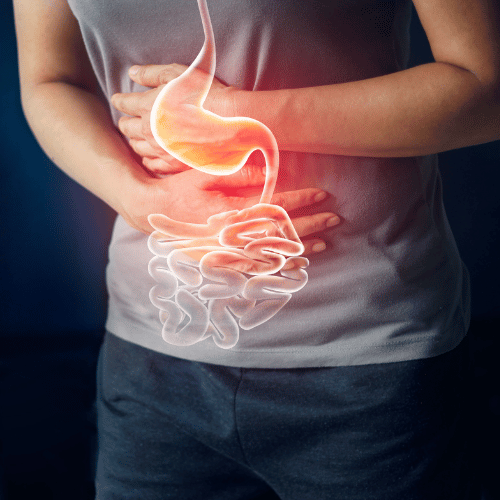
From Marathon Runner to Chronic Knee Pain
This is Tony’s story. He came to us with ongoing knee pain that worsened at work.
Conditions > Stomach Pain
Abdominal pain can stem from a wide range of causes and should be thoroughly investigated to determine its origin.
It may present as either acute or chronic discomfort and can be attributed to a variety of underlying issues, including problems with the stomach, appendix, gallbladder, spleen, bowel, liver, or gynecological organs.
Each of these potential causes requires careful examination to ensure an accurate diagnosis and appropriate treatment.




Occasionally, abdominal pain may be felt in the abdomen but can actually originate from organs situated near the abdominal area, such as the lower lungs, kidneys, or gynaecological structures. This phenomenon, known as referred pain, can sometimes make it challenging to identify the exact source of the discomfort.
Given the complexity of these potential causes, it is essential to consult a doctor for a thorough examination and further investigation. A healthcare professional can help determine the underlying issue and provide appropriate treatment based on a comprehensive assessment of your symptoms and medical history.
Stomach pain can manifest in various ways, including:


Our approach to diagnosing and treating stomach pain involves a comprehensive evaluation to pinpoint the underlying cause. This process typically starts with a detailed discussion of your symptoms and a physical examination.
To gain a clearer understanding of your condition, diagnostic tests may be conducted, including blood tests, ultrasound, endoscopy, or CT scans. Based on the results, a tailored treatment plan is developed.
This plan may include medications, dietary changes, lifestyle adjustments, or, in some cases, surgical intervention, all aimed at addressing the root of the problem and alleviating your symptoms.
While some stomach pain is minor and temporary, certain symptoms require prompt medical evaluation:


While many cases of stomach pain are benign, some can indicate more serious conditions that require immediate attention.
For instance, peptic ulcer disease involves chronic ulcers that may lead to complications such as bleeding or perforation. Pancreatitis, an inflammation of the pancreas, can cause severe abdominal pain and necessitates urgent care.
Bowel obstruction, a blockage in the intestines, can result in intense pain and requires prompt treatment. Additionally, endometriosis is a condition where tissue similar to the uterine lining grows outside the uterus, causing abdominal pain.
Early detection and treatment of these conditions are crucial for effective management and recovery.


If persistent stomach pain troubles you, seeking an appointment with one of our doctors is essential. A comprehensive consultation and examination will aid in identifying the cause and devising an appropriate treatment plan.
We work with experienced consultants & healthcare professionals who have received positive feedback from our patients, and with whom we have established long-term relationships.
Use our online booking engine or book your test by giving us a call.
On the online booking engine select the “appointment type” you need.
You will be seen by one of our friendly doctors or trained clinicians.
Latest Episode
Tune in to our podcast to explore the world of healthcare and learn from distinguished special guests. We cover everything from preventative measures to cutting-edge treatments so that you can stay informed and up-to-date on health-related things.

This is Tony’s story. He came to us with ongoing knee pain that worsened at work.

A lot is said about medical weight loss but we are here to debunk the myths for you.

This is Kate’s story. She visited us last year and saw great improvements in her health and quality of life.
Subscribe for latest updates & news


From same-day private GP and blood test appointments to visa medicals, a sexual and reproductive health clinic, and preventative health screenings, we are here to help.
Contact Us
Accepted Insurance Companies






Please note that Walk-in Clinic is a private medical centre & not an NHS service. Harley Walk-in Clinic Ltd company registration no. 07472804